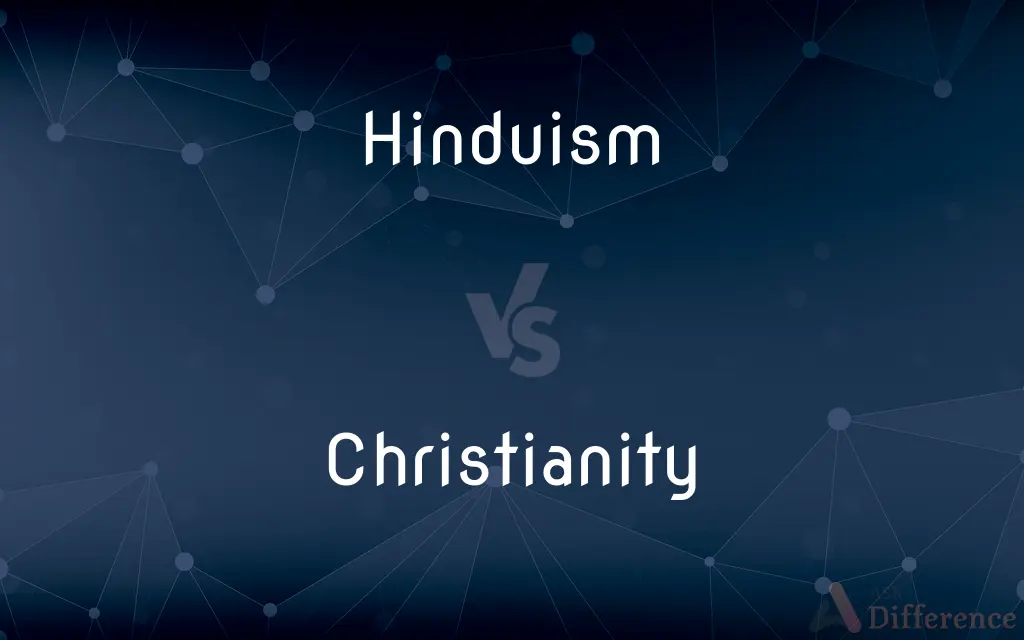Hinduism vs. Christianity — What's the Difference?
Edited by Tayyaba Rehman — By Maham Liaqat — Updated on April 17, 2024
Hinduism is a polytheistic religion with a cyclical view of life, emphasizing karma and reincarnation, while Christianity is monotheistic, focusing on salvation through Jesus Christ and an eternal afterlife.

Difference Between Hinduism and Christianity
Table of Contents
ADVERTISEMENT
Key Differences
Hinduism, with its origins in ancient India, encompasses a variety of beliefs and practices, recognizing multiple deities and paths to spirituality. Christianity, originating from Judaism in the 1st century CE, centers on the belief in one God and the teachings of Jesus Christ.
The concept of salvation in Hinduism is often achieved through self-realization and liberation (moksha) from the cycle of rebirth, guided by one's karma and dharma. In Christianity, salvation is attained through faith in Jesus Christ, who is believed to have died for humanity's sins and resurrected.
Hindu scriptures include the Vedas, Upanishads, and the epics like Mahabharata and Ramayana, which offer a complex framework of philosophy and morality. Christian doctrine is primarily based on the Bible, consisting of the Old and New Testaments, which outline moral teachings and the life of Jesus.
Hindu worship practices are diverse, including rituals, meditation, and offerings to various deities, often performed at temples or at home. Christian worship typically involves communal services with prayer, scripture reading, and hymns, primarily conducted in churches.
The approach to religious imagery and idols in Hinduism is integral, with numerous representations of gods and goddesses that are worshipped. Conversely, Christianity generally eschews idols, focusing worship on God and Jesus Christ, often symbolized by the cross.
ADVERTISEMENT
Comparison Chart
Number of Gods
Polytheistic, many gods
Monotheistic, one God
Concept of Salvation
Liberation from rebirth cycle
Eternal life through Jesus
Scriptures
Vedas, Upanishads, Epics
Bible (Old and New Testaments)
Worship Practices
Rituals, meditation, offerings
Communal services, prayer, hymns
Religious Imagery
Extensive use of idols
Limited, mainly symbolic icons
Compare with Definitions
Hinduism
A major world religion originating in the Indian subcontinent, characterized by a belief in reincarnation and a multitude of gods.
Hinduism celebrates diverse festivals like Diwali and Holi, which have deep spiritual significance.
Christianity
A community-centered faith that gathers for worship, prayer, and sacraments like Communion.
Christians often partake in Communion to remember Jesus' sacrifice.
Hinduism
A cultural and community-oriented religion with strong traditional practices and societal roles.
Hinduism influences various aspects of daily life, including dietary habits and marriage rituals.
Christianity
A religion with a strong missionary tradition, focusing on the conversion and baptism of new believers.
Christianity has spread worldwide largely through missionary work.
Hinduism
A religion that practices dharma, the moral law combined with spiritual discipline.
Followers of Hinduism strive to live their lives according to their dharma.
Christianity
A doctrinal religion with creeds and theological debates that shaped its development.
The Nicene Creed is a statement of Christian faith that articulates the belief in the Trinity.
Hinduism
A religion known for its vast epics and scriptures that guide the ethical and moral life of its adherents.
The Bhagavad Gita, part of the Mahabharata, is a key philosophical guide for many Hindus.
Christianity
A monotheistic religion based on the life and teachings of Jesus Christ as recounted in the New Testament.
Christianity's central event is the resurrection of Jesus, celebrated at Easter.
Hinduism
A faith that emphasizes personal spirituality and enlightenment.
Meditation and yoga are integral practices in Hinduism for achieving spiritual growth.
Christianity
A faith emphasizing love, forgiveness, and redemption.
Christian teachings stress forgiving others as God has forgiven you.
Hinduism
Hinduism () is an Indian religion and dharma, or way of life. It is the world's third-largest religion, with over 1.2 billion followers, or 15–16% of the global population, known as Hindus.
Christianity
Christianity is an Abrahamic monotheistic religion based on the life and teachings of Jesus of Nazareth. It is the world's largest religion, with about 2.4 billion followers.
Hinduism
A major religious and cultural tradition of South Asia, which developed from Vedic religion.
Christianity
A religion based on the life and teachings of Jesus. Most forms of Christianity hold that Jesus is the son of God and is the second person of the Trinity, through whom humans may attain redemption from sin.
Hinduism
A religious, philosophical, and cultural tradition that developed in India with the composition of the Vedas, characterized by belief in a supreme being of many forms and natures, by the view that opposing theories are aspects of one eternal truth, by the desire for liberation from earthly evils, and by belief in reincarnation.
Christianity
Christians as a group; Christendom.
Hinduism
The dominant religion of India; characterized by a caste system anud belief in reincarnation.
Christianity
The state or fact of being a Christian.
Hinduism
A complex of beliefs and values and customs including worship of many gods, especially the Trimurti composed of Brahma the Creator; Vishnu the preserver; and Shiva the destroyer.
Christianity
Pl. Chris·ti·an·i·ties A particular form or sect of the Christian religion
The Christianities of antiquity.
Hinduism
The predominant religion of India; characterized by a caste system and belief in reincarnation
Christianity
The religion of Christians; the system of doctrines and precepts taught by Christ.
Hinduism
A body of religious and philosophical beliefs and cultural practices native to India and characterized by a belief in reincarnation and a supreme beingof many forms and natures, by the view that opposing theories are aspects of one eternal truth, and by a desire for liberation from earthly evils
Christianity
Practical conformity of one's inward and outward life to the spirit of the Christian religion
Christianity
The body of Christian believers.
To Walys fled the christianiteeOf olde Britons.
Christianity
A monotheistic system of beliefs and practices based on the Old Testament and the teachings of Jesus as embodied in the New Testament and emphasizing the role of Jesus as savior
Christianity
The collective body of Christians throughout the world and history (found predominantly in Europe and the Americas and Australia);
For a thousand years the Roman Catholic Church was the principal church of Christendom
Common Curiosities
What are the main texts of Hinduism and Christianity?
Hinduism's texts include the Vedas and the Upanishads, while Christianity is based on the Bible.
How do Hinduism and Christianity view the afterlife?
Hinduism believes in a cyclical rebirth influenced by karma, while Christianity believes in eternal life in heaven or hell.
Can you convert to Hinduism or Christianity?
Hinduism does not traditionally seek converts, though one can adopt its practices; Christianity actively seeks and welcomes converts.
How do both religions handle sin?
Hinduism sees sin as actions that create bad karma and hinder spiritual progress; Christianity views sin as moral disobedience to God’s laws.
What is the significance of fasting in both religions?
Fasting is practiced in both religions as a means of spiritual purification and discipline.
What role does ritual play in both religions?
Rituals are central to both, with Hinduism having a more varied range depending on regional and family traditions, while Christian rituals are generally standardized.
What is the ultimate goal of life in Hinduism and Christianity?
In Hinduism, it is moksha, or liberation from the cycle of rebirth; in Christianity, it is salvation and eternal life with God.
How important is pilgrimage in both religions?
Both religions hold pilgrimage as important, with Hindus visiting places like Varanasi and Christians visiting sites like Jerusalem.
How do the festivals of both religions reflect their theological beliefs?
Hindu festivals often celebrate events from their scriptures, while Christian holidays commemorate events in the life of Jesus.
How do both religions view the creation of the universe?
Hinduism sees the universe as cyclically created and destroyed; Christianity views creation as a singular act by God.
What is the role of a priest or spiritual leader in both religions?
In Hinduism, priests perform rituals and guide religious practices; in Christianity, priests or pastors lead worship and provide spiritual guidance.
How do both religions approach the concept of charity?
Charity is a key practice in both, seen as a duty in Hinduism and a manifestation of love in Christianity.
What are the philosophical differences between Hinduism and Christianity?
Hinduism is often non-exclusive and incorporates various philosophies; Christianity is based on the specific teachings and divinity of Jesus.
What are the ethical teachings common to both religions?
Both emphasize moral living, honesty, and compassion toward others.
How is the concept of God different in Hinduism and Christianity?
Hinduism has a complex and varied concept of God, including a supreme cosmic spirit and multiple deities; Christianity believes in one omnipotent, omniscient God.
Share Your Discovery

Previous Comparison
Matrix vs. Determinant
Next Comparison
Grain vs. MilletAuthor Spotlight
Written by
Maham LiaqatEdited by
Tayyaba RehmanTayyaba Rehman is a distinguished writer, currently serving as a primary contributor to askdifference.com. As a researcher in semantics and etymology, Tayyaba's passion for the complexity of languages and their distinctions has found a perfect home on the platform. Tayyaba delves into the intricacies of language, distinguishing between commonly confused words and phrases, thereby providing clarity for readers worldwide.















































